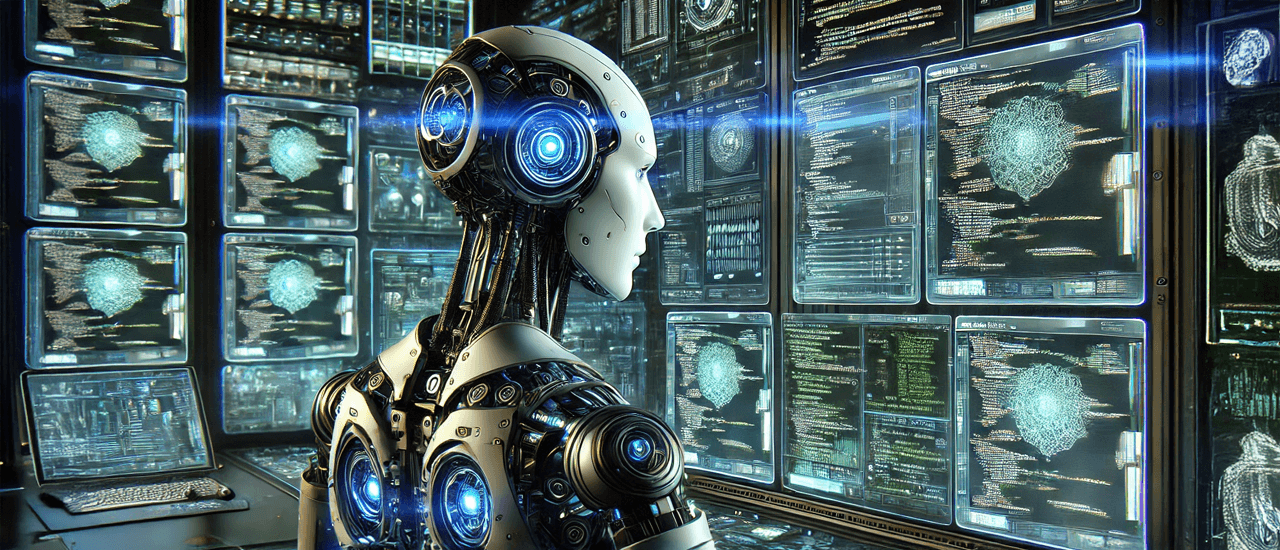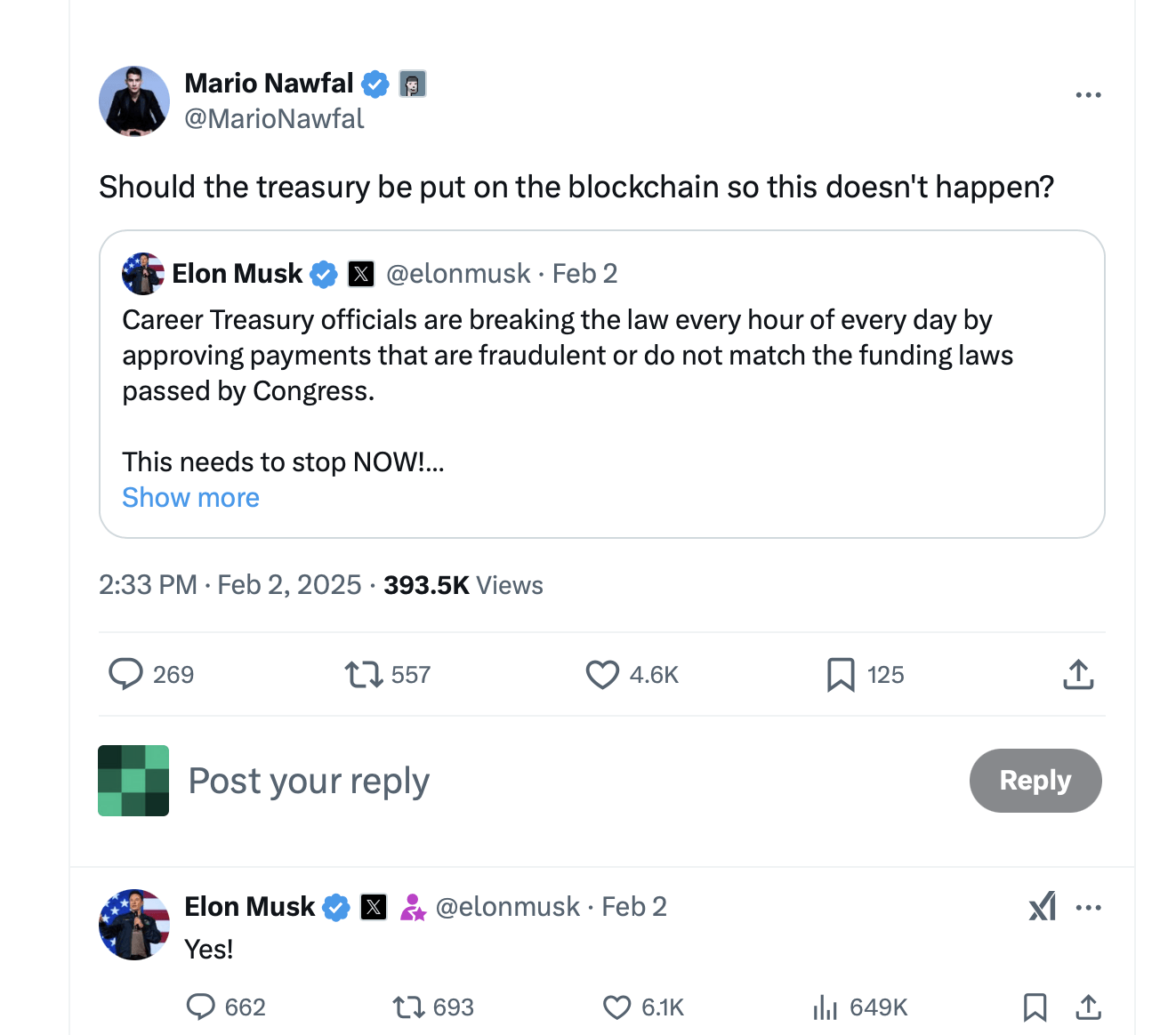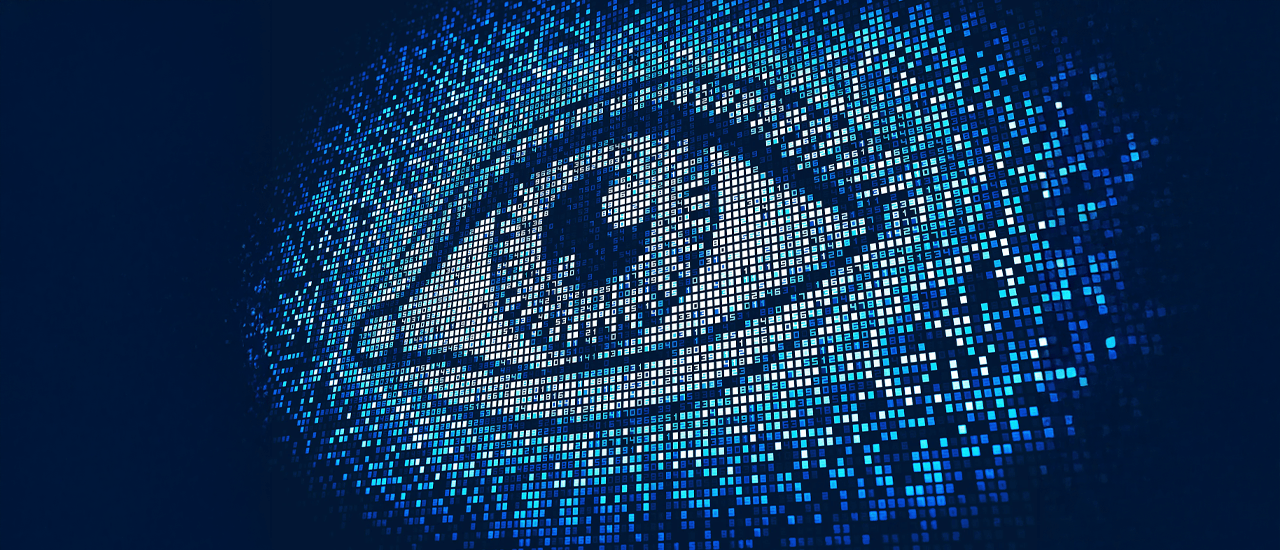Over the previous week, there was a big quantity of controversy directed on the newly established Division of Authorities Effectivity (DOGE). Though opinions stay divided relating to its operations, synthetic intelligence (AI) and blockchain expertise will doubtless be employed to higher optimize authorities spending on a everlasting distributed ledger system.
A Take a look at How DOGE May Unleash AI and Blockchain to Rein in Federal Waste
Simply final month, DOGE was created by way of an government order signed by U.S. President Donald Trump on Jan. 20, 2025. Many who’ve adopted Trump and Elon Musk, the present head of DOGE, perceive that the entity was based to modernize federal expertise and software program, thereby enhancing governmental effectivity and productiveness. Primarily, DOGE seeks to cut back authorities waste, slash extra laws, and restructure federal companies to remove pointless spending.
Whether or not you like Donald Trump or can’t stand him, or assume the richest man on the earth, Elon Musk, is terrible, that isn’t the purpose of this editorial. This report gives a theoretical examination of the benefits that synthetic intelligence (AI) and distributed ledger expertise may present the federal authorities to boost oversight and curb spending. It’s well known that Musk is an ardent supporter of AI, and a latest report disclosed that DOGE could also be inclined to include blockchain into the company’s endeavors.
What follows is an exploration of how each applied sciences may show instrumental in cultivating fiscal accountability in Washington.
AI’s Position in Enhancing Authorities Spending
Synthetic intelligence (AI) has taken heart stage not too long ago following Openai’s launch of Chatgpt, which ushered in an period of generative video, coding, and image-making. Deepseek’s market debut has really upended expectations. AI holds the promise of revolutionizing authorities expenditure by pinpointing inefficiencies and curbing waste.
Governments oversee in depth budgets throughout sectors akin to healthcare, protection, schooling, and infrastructure, ceaselessly contending with opaque monetary flows. AI can scrutinize in depth datasets to uncover irregularities, together with duplicate funds, inflated contractor bills, irregular procurement patterns, or outright fraud.

A number of research predict that synthetic intelligence (AI) will add trillions of {dollars} to the worldwide financial system.
Machine studying fashions, honed on historic knowledge, are adept at flagging transactions that deviate from established norms, thereby enabling auditors to promptly examine questionable actions. For instance, in healthcare, AI may expose fraudulent insurance coverage claims or redundant medical procedures, thereby conserving billions. Predictive analytics additional refines foresight, enabling governments to simulate price range outcomes and avert misallocations—as an illustration, by reallocating infrastructure funds earlier than price overruns materialize.
Furthermore, AI automates routine capabilities like bill processing, thereby diminishing administrative delays and human error. By changing uncooked knowledge into actionable insights, AI empowers policymakers to allocate assets strategically and foster fiscal self-discipline. The mixture of AI’s analytical experience with scalable cloud computing ensures that even small municipalities can make the most of these instruments, broadening entry to classy monetary governance.
Blockchain’s Position in Securing Authorities Spending
Blockchain expertise has been in existence for fairly a while because the creation of Bitcoin. Every transaction, inscribed on Bitcoin’s decentralized ledger, turns into completely traceable and accessible to approved events—auditors, companies, and even residents. Such transparency can deter corruption, since modifying knowledge calls for consensus throughout the community, rendering clandestine actions practically unimaginable.

Research additional recommend that blockchain expertise might add trillions of {dollars} to the worldwide financial system by 2030.
One other instance is that sensible contracts—self-executing agreements on blockchain—might automate processes akin to grant disbursements or vendor funds by releasing funds solely when predefined circumstances are glad. As an example, infrastructure initiatives may mechanically set off funds upon verified milestone completions, thereby minimizing delays and bureaucratic interference.
Public entry to anonymized ledger knowledge might additional bolster civic engagement by enabling residents to observe spending and maintain officers accountable. In catastrophe reduction, for instance, blockchain may make sure that help reaches its meant recipients by monitoring allocations and stopping misdirection. Moreover, integrating blockchain with AI creates a safer ecosystem: AI detects irregularities, whereas blockchain preserves the findings, producing an auditable path.
Musk’s Perspective
Though Musk is presently acknowledged as the pinnacle of the newly established company, it’s well-known that the proprietor of X is deeply invested in AI expertise and blockchain. Initially, Musk has made appreciable strides with the generative AI utility Grok and xAI. We’re additionally conscious of Musk’s “Colossus,” an enormous supercomputing facility in Memphis, Tennessee, developed by his xAI. Studies point out that the ability commenced with 100,000 Nvidia H100 GPUs, establishing it as one of many largest AI compute clusters on the earth. Furthermore, Colossus now operates with 200,000 GPUs following a latest improve.

Supply: Mario Nawfal by way of X.
Elon Musk has constantly advocated for blockchain expertise, ceaselessly emphasizing its potential to boost transparency, effectivity, and scale back prices. When X influencer Mario Nawfal requested if “ought to the treasury be placed on the blockchain” so fraudulent funds don’t happen, Musk responded “sure.” Musk and Tesla assist dogecoin (DOGE) and bitcoin (BTC), and he has ceaselessly related blockchain with monetary independence and decentralization, constant together with his imaginative and prescient of technological progress.
AI and Blockchain’s Double-Sided Sword
Whereas some could regard AI and blockchain as helpful, others worry that they might pave the way in which for a realm dominated by techno-oligarchs. Though AI and blockchain provide effectivity, many argue that they threat facilitating surveillance capitalism and state overreach. AI’s>freeze funds, or justify discriminatory insurance policies. Blockchain’s immutable ledgers, if centralized, might completely embed delicate knowledge, thereby allowing authoritarian monitoring of people.

Whereas there are various advantages to AI and blockchain, some imagine it might result in a techno-enhanced oligarchy.
Collectively, they might facilitate automated mass surveillance—sensible contracts that limit welfare entry or AI-blockchain networks that monitor transactions to suppress dissent. Absent enough safeguards, these applied sciences threat eroding privateness, autonomy, and decentralization. Nonetheless, most all applied sciences include a double-sided sword. Nonetheless, the American citizens elected Donald Trump because the forty seventh president of america, and DOGE was established and well-known lengthy earlier than he assumed workplace.
Quite a few U.S. companies have been codified into authorities by means of government orders, together with the Protection Intelligence Company (DIA), the Environmental Safety Company (EPA), the Bureau of Alcohol, Tobacco, and Firearms (ATF), the Council on Environmental High quality (CEQ), the Nationwide Safety Company (NSA), the Welfare Administration, the Drug Enforcement Administration (DEA), the Federal Emergency Administration Company (FEMA), and the Workplace of Homeland Safety.


